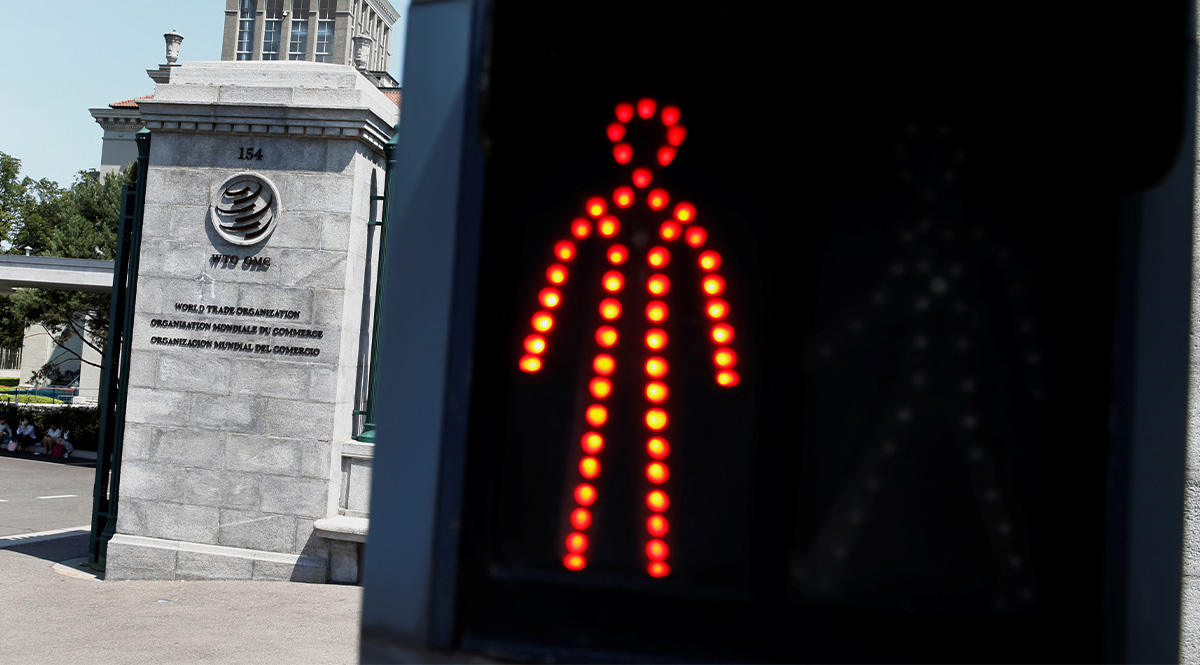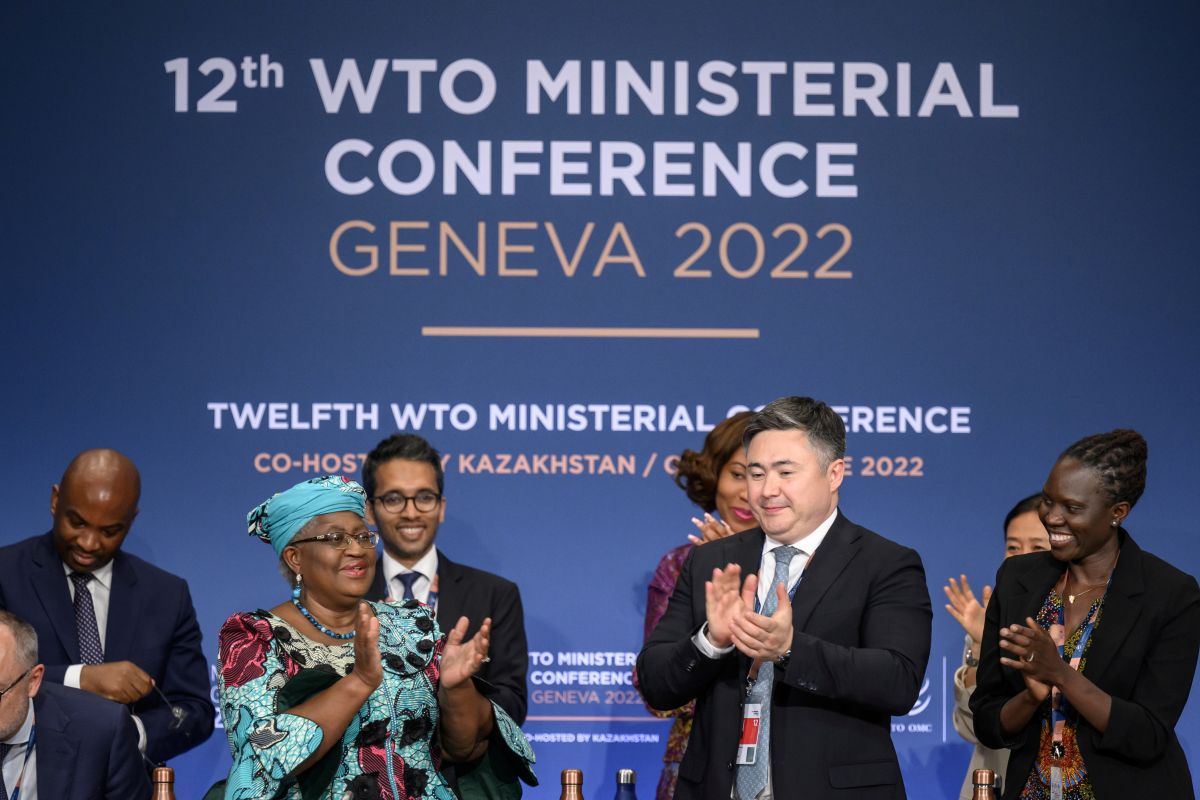Members Seek to Mitigate Appellate Body Paralysis in WTO Dispute Settlement
The crisis in the WTO’s dispute settlement system is politically motivated and there is no indication that it will end any time soon. The interim solutions produced in recent years are less effective than the system from 1995-2019. The WTO’s problems, not only in resolving disputes but also in its other functions, result from changes in the global economy and politics, which are becoming increasingly multipolar. It will be beneficial for Poland to reform the organisation and adapt it to the challenges of the current world. In this context, it is also advisable to support the strengthening of the EU’s economic resilience.
 DENIS BALIBOUSE / Reuters / Forum
DENIS BALIBOUSE / Reuters / Forum
Dispute settlement is one of the World Trade Organisation’s (WTO) main functions. The dispute settlement system is mandatory—members cannot refuse to participate in proceedings. It also provides for the possibility of coercive enforcement in the form of so-called countermeasures, that is, the suspension of WTO concessions for the defendant, authorised after a final ruling is issued. Dispute settlement involves two instances. In the first, the proceedings take place before a panel whose members are selected on an ad hoc basis for each case. In the second, it is held before the Appellate Body (AB), which should consist of seven judges, elected for four-year terms, three of which hear each appeal.
Paralysis of the Appellate Body
Since 2016 (under the Obama administration), the U.S. has been blocking appointments of new judges, claiming that the AB had been exceeding its mandate. This policy was maintained throughout Donald Trump’s time in office and continues in Joe Biden’s current term. Despite the political differences between the Democratic Party and the Republican Party, there is a consensus between them on this issue. The reluctance of the U.S. to submit to binding WTO rulings has been evident since the organisation’s inception, but the tensions are heightened by changes in the global economy and politics. The WTO was established in 1995 in a unipolar world dominated by the U.S. and geared towards liberalisation in the economy and international trade. These realities have changed with the rise of China (and therefore the relative weakening of the West) and the increasing acceptance of state intervention in the global economy, which affects attitudes to free trade, and consequently the WTO, in the U.S. Without an adaptation of the organisation to current realities, its operation will be hampered in every area, including dispute settlement.
As a result of the U.S. actions, since December 2019 the AB has had fewer than three judges, which has resulted in the impossibility of adjudicating appeals. Cases can be heard at first instance, but when one party appeals, it makes it impossible to obtain a binding ruling and authorisation of countermeasures. The enforcement of a first-instance decision thus becomes dependent on the defendant, which may prevent the conclusion of the proceedings. In practice, this is tantamount to paralysing the dispute resolution system.
Attempts made so far to unblock the AB have not been successful. The declaration issued at the Twelfth Ministerial Conference in Geneva in 2022 indicated as a goal the restoration of the dispute settlement system by 2024. This was repeated by the Thirteenth Ministerial Conference in Abu Dhabi (26 February to 2 March this year), where no agreement was reached again. The U.S. Trade Representative has said that negotiations will continue after the conference, but it is unlikely that the United States will completely change its attitude a few months before the presidential elections in November this year. In the short term, the talks will be informal and held at technical level. However, they will not lead to a resolution of the crisis without political decisions, and there is no indication that these will be taken quickly. Moreover, the discussions will focus not only on getting the system working again, but especially on reforming it. A possible solution will therefore be more difficult to work out than the mere election of judges and will have to take into account the interests of all parties. Even a possible agreement from the U.S. therefore does not currently guarantee that the proposed action will not be blocked by other members of the organisation.
The Functioning of the WTO Dispute Settlement System
Assessing the effectiveness of the WTO dispute settlement system is difficult, even for the period when it was working properly. For one thing, of the 622 cases brought before it (593 before the AB paralysis), retaliation was authorised in only nine cases. Moreover, in some cases, even authorising it did not affect the defendants’ behaviour—such as in the Antigua and Barbuda v US (internet gambling) case, in which the U.S. did not change their actions found to be incompatible with the WTO rules. One weakness of WTO remedies is that they are prospective-oriented—they do not lead to compensation for the damage caused, but are only intended to make the losing party change its behaviour. In practice, this means that WTO members in some cases can violate the organisation’s rules for years without suffering consequences. For this reason, it may be more profitable for states to accept less favourable and WTO-incompatible, but promptly available solutions negotiated bilaterally than to use the dispute settlement system. On the other hand, in 124 of the cases at issue, the respondent notified the WTO of the implementation of the recommendations contained in the settlement without subsequent objection by the complainant (i.e., to the complainant’s satisfaction), and in 113 cases the parties reached an agreement and notified it to the organisation. It is not possible to state clearly what these decisions were based on, but agreements and consensual implementation of rulings also resulted in advantageous greater predictability in relations between WTO members.
Interim Solution
In April 2020, a multilateral agreement within the WTO system concluded by 19 members of the organisation (including the EU and China, which have so far been joined by another seven countries) entered into force, establishing a mechanism to temporarily replace the defunct AB. The parties to the agreement created the Multi-Party Interim Appeal Arrangement (MPIA), which operates on principles analogous to the AB, but is based on the arbitration provisions of WTO Dispute Settlement Understanding. Proceedings between parties to the agreement are thus conducted in the first instance under the operational part of the WTO dispute settlement system, with the MPIA acting as an appeal mechanism.
In addition to the non-participation in the MPIA of many of the world’s key economies—notably the U.S., but also India or Turkey—the weakness of the mechanism is the possibility of withdrawing from it without leaving the WTO. This means that the agreement only functions as long as no major tensions arise between its parties. To date, the MPIA has only resolved one dispute. Given the decline in the number of cases referred to the WTO for consultations and settlement, there is no doubt that countries’ confidence in the MPIA and its relevance is smaller than that of the 1995-2019 system with a functioning AB.
Conclusions
The WTO dispute settlement system is defunct for political reasons—obstruction on the part of the U.S., on which there is a long-standing and cross-party consensus. The paralysis is the result of, among other things, growing tensions between the major players in international relations and new intellectual climate in thinking about the role of the state in the economy. A possible restoration of the system’s operation will probably only occur in the event of broader reform of the WTO. Poland and the EU may try to influence the U.S. to agree to unblock the AB, which would be positive for their image as actors supporting the international order based on stable rules. It will also be important for Poland to support actions for greater economic independence for the EU, as well as maintaining close relations with the U.S. and strengthening relations with developing countries. In this way, the EU will be better prepared for possible changes in the governance of global trade and will reduce the difficulties associated with them.
The MPIA cannot fully replace the AB in the WTO dispute settlement system because it is not mandatory and the U.S., one of the most frequent respondents and complainants, does not participate. However, it is advisable for Poland and the EU to promote participation in the agreement, as it stabilises the law-based order in international trade and can lead to binding settlements, which is impossible within the defunct AB.





